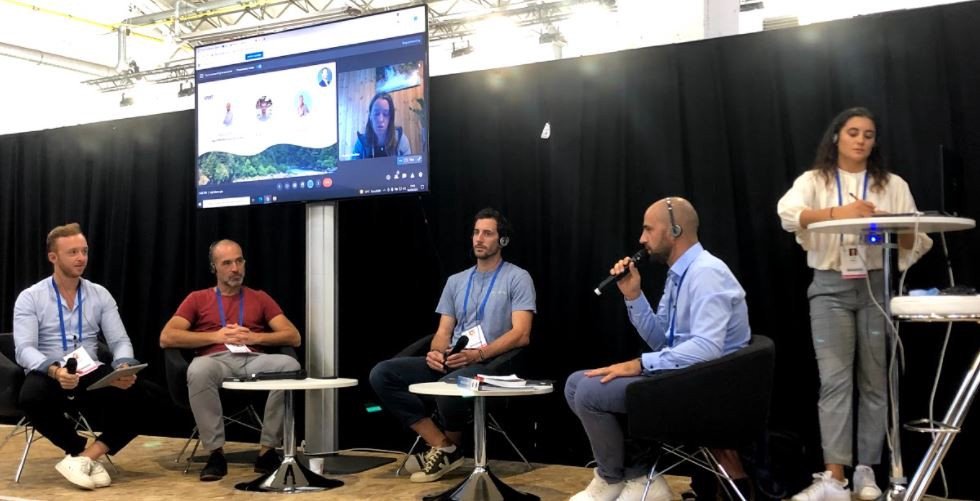SPORT AND BIODIVERSITY
From Left to Right: Francois Singer (17 Sport), Raphael Boutin (Ligue Méditerranée de Football), Marlène Devillez (kayaker & hydrologist), Thomas Cervetti (Nomads Surfing), Benjamin Adler (Game Earth) and Louise Amsilli (17 Sport).
IUCN WORLD CONSERVATION CONGRESS: 17 SPORT ROUNDTABLE RECAP
With the IUCN’s vital World Conservation Congress in full swing, 17 Sport’s Francois Singer moderated a panel on sport and its role in the preservation of biodiversity.
With contributions from Raphael Boutin (Ligue Méditerranée de Football - LMF), Marlène Devillez (kayaker & hydrologist), Thomas Cervetti (Nomads Surfing) and Benjamin Adler (Game Earth), the discussion was an encouraging reminder that there are many bright and agile minds dedicated to using sport to prevent climate change and preserve biodiversity.
Francois kicked off the session with a reminder that although the 17 SDGs will cost about $3 billion to achieve, their realization has the potential to produce $12 billion of commercial opportunity (Axa 2019).
Raphaël then presented the plans of the LMF. The Ligue oversees the South-PACA region in France with about 600 clubs and 2.2 million licenced players. In his words, “these numbers assign sport the duty to be a vector of change” - and given “sport has educational virtues we ought to capitalize on”, it has the power to meet this obligation.
Through Raphael’s leadership, they have developed very thorough guides to help clubs and players to be positive eco-citizens, understand green transport and other key aspects of sustainability. Additionally, the LMF has put in effort internally to be greener and more environmentally friendly.
LIFE BELOW WATER
Joining the panel virtually, Marlène spoke of the significant changes in the rivers she observed when kayaking, but what really created that click in her mind was when the Doubs River dried up and nobody around really changed their consuming habits. From this moment she “decided to use sport and physical activity as a way to bring awareness on water-related issues”. Her and her partner drastically changed their lifestyle and competition habits to be more responsible. They started to speak at schools and at festivals to try to answer the challenging fact that it is difficult to show “the concrete consequences on daily life of scientists’ warnings”. She affirmed that at the moment many federations and governing bodies in sport seemingly aren’t too concerned, but that they will need to develop more responsible competition schedules and regulations to involve athletes more in sustainability.
Founders of Nomads Surfing, as surfers, Thomas and his associate wanted to contribute to the conservation of their playground - the ocean. They focus on using local and renewable materials for their surfboards while keeping cost down as much as possible by producing closer to home in Portugal. They try to reduce their margin as much as possible to incite consumers to buy their products rather than having to go for a less ethical brand because they can’t afford Nomads Surfing.
They created a label called Nomad Oceancare to help environmental NGOs in their actions as well as to advise businesses on better practices. Ultimately, they work to the ethos that “Business has a social and economic impact regardless, so it is possible to do better while still creating profit.”
They’ve decided to focus on sponsoring young surfers that share their values because the youth are the future, and they want to help them reach their goals while being aligned with their beliefs. They think that, as a company, there also needs to be a constant effort internally because it is their own engagement that gives them credibility - they must lead by example.
REPAIR, PREPARE, PRESERVE
Closing off the panel, Benjamin spoke on Game Earth - the first program of carbon offsetting dedicated to professional sport. Climate advocates, they “want to use the power of sport to repair, prepare and preserve”, ultimately to embed sustainability and carbon offsetting into the culture of sport.
Believing that “for a long time, the entertainment industry failed to truly be aware of its capacity to have an impact”, they wanted to move beyond tree-planting schemes to touch on more aspects of the environment. They mainly act by financially supporting NGOs that act on very specific matters of sustainability. Their prices are higher because they’ve calculated the actual cost - and commonly accepted €7 is simply not enough.
Their goal is also to create a bridge between sport and sustainability as they’re often seen as unrelated or antagonistic. There is a will nowadays from actors in sport to invest in these issues, but there is still a lack of collective agreement around the necessity for action. As a result, the onus is on individuals to voluntarily act. It can create eco-anxiety for sport entities because it is still quite new and they’re not sure what to do and how, but for Benjamin, the starting point, is be aligned in the values you espouse and the way you live and operate as a business.
As Benjamin summed up, “We must move beyond volunteerism and move towards systemic action.” These sport and sustainability pioneers together provide hope that this outcome is possible.
The panel was dedicated to Xavier Rivoire. Our deepest sympathies to his family.


